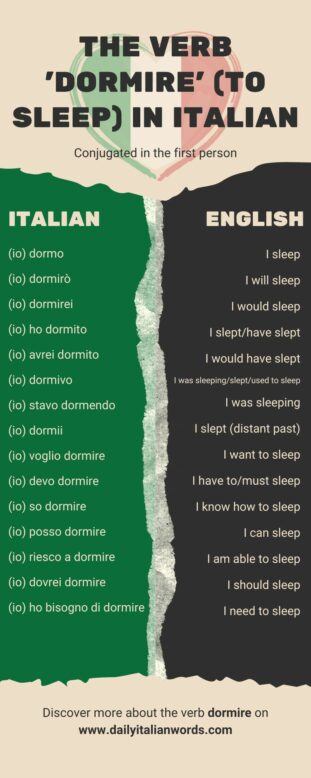The way to say to sleep in Italian is dormire. If you have trouble remembering this word, I find it helps to think of the closely related English term dormitory which, of course, refers to a large bedroom where many people sleep.

Because dormire is a regular -ire verb, it conjugates in the following manner:
I sleep
You sleep (informal)
You sleep (formal)
He sleeps
She sleeps
We sleep
You (all) sleep
They sleep
Io dormo
Tu dormi
Lei dorme
Lui dorme
Lei dorme
Noi dormiamo
Voi dormite
Loro dormono

I neonati dormono tante ore al giorno.
Newborns sleep for many hours a day.

Below are a number of useful terms that derive from the verb dormire:
- dormita = sleep, nap (noun)
- dormiglione/a = sleepyhead
- dormiveglia = half-asleep
- dormiente = sleeper, inactive, dormant
- dormicchiare = to doze
- addormentarsi = to fall asleep
- addormentato/a = asleep, sleeping, sleepy, slow
If you want to talk about someone who is in a deep sleep, you can translate the phrase literally – dormire profondamente (to sleep deeply) – or you can choose one of these more colourful figures of speech!
- dormire come una marmotta = lit: to sleep like a groundhog
- dormire come un tasso = lit: to sleep like a badger
- dormire come un ghiro = lit: to sleep like a dormouse
- dormire come un sasso = lit: to sleep like a stone
- dormire il sonno del giusto (dei giusti) = to sleep with a clean conscience (giusto means right)
- dorme così profondamente che non lo sveglierebbero nemmeno le cannonate = lit: he/she is sleeping (so soundly) that not even cannons would wake him/her up

The phrase andare a dormire in Italian literally translates as to go to sleep but it can also mean to go to bed.
Vai a dormire subito!
Go to bed right away!
In addition to the literal meaning of dormire, there are also a number of figurative translations including to laze about, to bore, to be neglected and to put off a decision. Below are four example phrases featuring the verb used in its figurative sense.
In questa azienda si dorme invece di lavorare.
At this company we laze about rather than work.
Il professore mi fa dormire con le sue lezioni antiquate.
The professor is boring me with his outdated lessons.

Il mio dottorato di ricerca dorme da anni.
I’ve neglected my PhD for years.
Non è una decisione da prendere alla leggera. Devo dormirci sopra.
This isn’t a decision to be taken lightly. I have to sleep on it.
Expressions and idioms containing the word ‘dormire’
Chi dorme non piglia pesci
Literal translation: those who sleep don’t catch fish
English equivalent: the early bird gets the worm
Dormire tra due guanciali
Literal translation: to sleep between two pillows
English meaning: to sleep comfortably without any worries
Dormire ad occhi aperti
Literal translation: to sleep with one’s eyes open
English meaning: to sleep with one’s eyes open
Dormire sugli allori
Literal translation: to sleep on the laurels
English meaning: to rest on one’s laurels
Dormire in piedi
Literal translation: to sleep on one’s feet
English meaning: to daydream, to space out, to be asleep on one’s feet

Heather Broster is a graduate with honours in linguistics from the University of Western Ontario. She is an aspiring polyglot, proficient in English and Italian, as well as Japanese, Welsh, and French to varying degrees of fluency. Originally from Toronto, Heather has resided in various countries, notably Italy for a period of six years. Her primary focus lies in the fields of language acquisition, education, and bilingual instruction.


